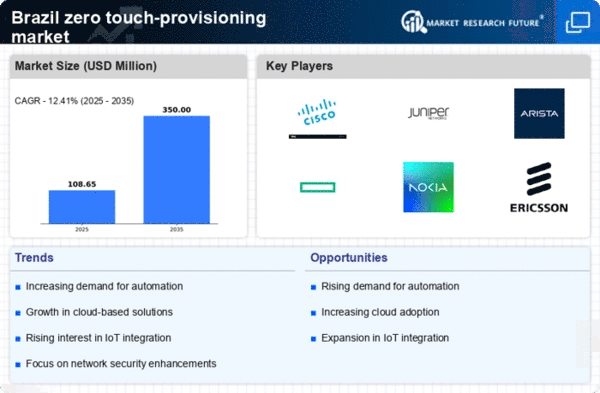Expansion of 5G Infrastructure
The rollout of 5G technology in Brazil is a critical driver for the zero touch-provisioning market. With the promise of faster data speeds and improved connectivity, 5G networks require advanced provisioning solutions to manage the increased complexity of network devices. The zero touch-provisioning market is likely to see a surge in demand as telecom operators and enterprises seek to automate the deployment and management of 5G-enabled devices. This transition is expected to enhance operational efficiency and reduce costs associated with manual provisioning processes. As Brazil continues to invest in its telecommunications infrastructure, the zero touch-provisioning market is poised for substantial growth, potentially reaching a market value of $500 million by 2027.
Growing Cybersecurity Concerns
As cyber threats continue to evolve, Brazilian organizations are increasingly prioritizing cybersecurity in their network management strategies. The zero touch-provisioning market is responding to this demand by incorporating robust security features into their solutions. Businesses are seeking provisioning methods that not only streamline device setup but also ensure secure configurations from the outset. This focus on security is likely to drive the adoption of zero touch-provisioning solutions, as organizations aim to mitigate risks associated with unauthorized access and data breaches. The market is expected to grow as companies recognize the importance of integrating security measures into their provisioning processes, potentially leading to a market expansion of 15% annually.
Integration with Cloud Services
The integration of zero touch-provisioning solutions with cloud services is becoming increasingly prevalent in Brazil. As businesses migrate to cloud-based platforms, the need for seamless device provisioning becomes paramount. The zero touch-provisioning market is adapting to this trend by offering solutions that facilitate the automatic configuration of devices connected to cloud environments. This integration not only simplifies the deployment process but also enhances the overall user experience. Companies are likely to invest in zero touch-provisioning solutions that can easily interface with their existing cloud infrastructure, thereby driving growth in the market. The potential for increased collaboration between cloud service providers and zero touch-provisioning vendors suggests a promising future for the industry.
Increased Focus on Cost Efficiency
In the competitive landscape of Brazilian businesses, there is a growing emphasis on cost efficiency. Organizations are increasingly recognizing the financial benefits of adopting zero touch-provisioning solutions. By automating the provisioning process, companies can significantly reduce labor costs and minimize the time required for device setup. This trend is particularly relevant for small and medium-sized enterprises (SMEs) that may lack extensive IT resources. The zero touch-provisioning market is likely to attract more SMEs as they seek to optimize their operations and allocate resources more effectively. As a result, the market is expected to expand, with an estimated growth rate of 20% annually as businesses strive to enhance their operational efficiency.
Rising Demand for Remote Work Solutions
The increasing trend of remote work in Brazil has led to a heightened demand for efficient network management solutions. As organizations adapt to flexible work environments, the zero touch-provisioning market is experiencing significant growth. Companies are seeking ways to streamline their network setups without the need for on-site IT personnel. This shift is reflected in a projected growth rate of approximately 25% in the adoption of zero touch-provisioning solutions over the next few years. The ability to deploy devices remotely and configure them automatically is becoming essential for businesses aiming to maintain productivity and connectivity. Consequently, the zero touch-provisioning market is positioned to benefit from this evolving work culture, as organizations prioritize solutions that facilitate seamless remote operations.
















